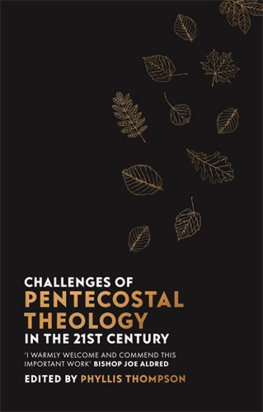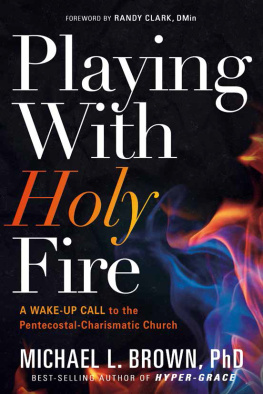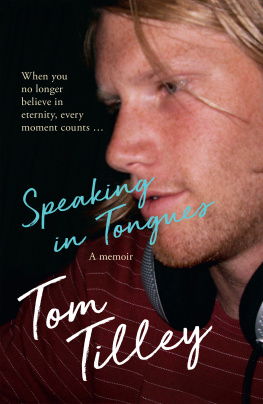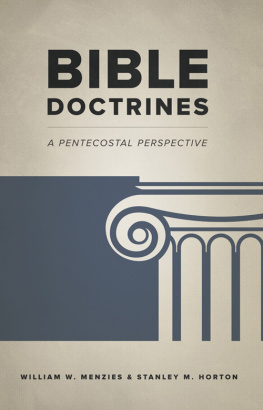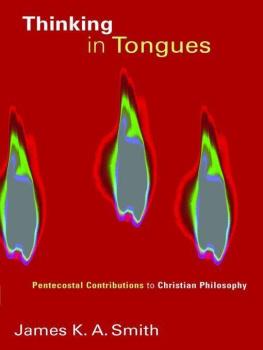Acknowledgments
Studying a small Pentecostal Church in Brooklyn provided a rare opportunity to intimately study the lives and experiences of religiously inspired New York City residents. This four-year study allowed for the development of close bonds with church members that studies involving numerous churches or a single large church denomination would find difficult to achieve to the same degree. I thank Pastor Redford and his wife Jamie for allowing me to attend Holy Ghost Church and become involved with the congregation. Allowing a researcher such intimate access into a church and the personal lives of its members requires substantial trust. I hope this book does justice to that trust. I thank Theresa for introducing me to Holy Ghost Church and allowing me to gain access to the church. I also thank this books other main characters, Denver, Amelie, Deacon Walter, Debbie, Lisa, Mr. and Mrs. Johnson, Gracie, and all the other members of the congregation for the many conversations and sharing with me their fascinating stories. The personal relationships formed throughout those fours years will live with me all my life.
The conception of this book originated in that magical, socio-cultural experiment called the city of New Orleansthe last romantic United States city. The conception materialized in Brooklyn with four years of ethnographic research in the Holy Ghost Church. The majority of the writing happened in New York City and St. Louis, specifically, the Brooklyn neighborhoods of Boerum Hill and Carroll Gardens and St. Louiss nearby suburb of Clayton. The final writing ended in the old colonial town of San Cristobal de las Casas, Mexicos Zapatista southern region in Chiapas. Certainly, my development as a social scientist is shaped by, among other things, three major factors: university education (University of New Orleans and New School for Social Research ), experiences living in New Orleans and New York, and extensive travel experiences in both strange and familiar places around the world.
Various colleagues and friends contributed in important ways to the production of this book. From the New School for Social Research, Terry Williams served as my mentor for the first draft, offering his advice and critical commentary that created an exciting exchange of dialogue. Terrys ideas and continued support influenced the development of this book and contributed to its final product. I also thank Vera Zolberg and Jos Casanova for helping with the original concepts developed in this book. My various friends from New York City offered great support throughout my participation in Holy Ghost Church life and the many hours of writing in coffee shops. Some of these friends include Pierre Bollock, Hector Vera, and Marisol Lopez.
From John Jay College of Criminal Justice, David Brothertonmy friend, colleague, and mentoroffered crucial support and guidance throughout the entire research and writing process, even while dancing nights away at Brooklyns Barbs. I will always be indebted to David who has truly influenced my critical thought and scholarship. The famous Jock Young, the brilliant notorious scoundrel to mainstream sociology, contributed in both direct and indirect ways to this book. Thanks Dave and Jock for your friendship and guidance. Im proud to call each of you my friend.
Barry Spunt, Boston romantic and expert researcher on heroin and New York City rock & roll, offered his many words of wisdom on various matters. All the time spent talking in your office (and racquetball ball) provided much needed relief. May all your Russian dreams come true.
Also from John Jay, thanks to Danny Kessler, Louis Kontos, Jayne Mooney, and others who no doubt contributed to this book in direct and indirect ways.
From the University of New Orleansthat underrated university on the lakeI thank David Gladstone, Vern Baxter and Susan Mann for all their support. David Gladstone, the traveling Henry David Thoreau, continues to serve as my friend and colleague. David continues to influence my life in profound ways. I look forward to our continued research and travels together. Vern Baxter guided my sociological development since early graduate school. His continued support and guidance is very much appreciated. Susan Mann, perhaps the most elegant and thoughtful person anyone could meet, is one of the best instructors of sociology incorporating critical thought in her classroom and guidance to her studentsshe so happens to also be an outstanding scholar.
In St. Louis, I thank my friend and colleague Nancy Shields (she also knew some cat from Chicago named Howard Becker) for offering unwavering support, patience, guidance, and advice. I look forward to our conversations on the back porch over white wine. I thank my colleague Robert Rocky Keel for his support in all of my endeavors, including the writing of this booklets have a drink in Germany. I also thank my other colleagues, friends, and students from the University of Missouri-St. Louis.
Special thanks to Alena Horn for providing linguistic analysis to the tongue-speaking transcripts.
Thanks to Peter Althouse and Michael Wilkinson for your great scholarship on Pentecostalism and offering support for this book.
Special thanks to the editors of Lexington books, especially Jana Hodges-Kluck for a great experience getting this book to publication. Thanks to Michael Sisskin for beginning the road to publication and Jay Song for taking it to the end.
Patrick Alfieri, that ranting intellectual Brooklyn romantic, remained supportive throughout the entire research and writing of this book. His constant advice and our many conversations contributed to all my forms of intellectual inquiry.
Robert Bobby Kemp, the man no fire wants to meet, offered his encouragement and dedication throughout my graduate and post-graduate career. Lets run with the bulls in Pamplona one more time.
Thanks to Anita DeVivo for editing an early draft of the book.
The Times Picayune s Mike Scott, movie critic and journalist, provided brilliant commentary and advice throughout the entire writing process. Mike edited each chapter of this book offering thoughtful critiques that greatly influenced the final product. I remain in his debt. Who dat baby!
Thanks to Fair Grinds Coffee in New Orleans, the Tea Lounge, Falls Caf (now closed) and Flying Saucer Caf (now closed) coffee shops in Brooklyn, Kaldis Coffee in St. Louis, and Tierra Adentro in San Cristobal de las Casas for the many cups of coffee while writing this book.
The enduring support of Paul Marina, Maren the matriarch Marina, Elena Marina, Brandon Marina, Hailey Marina, and Lagniappe Marina ( guau-guau! ) contributed to this book.
Thanks to Aurora Gonzales for taking an interest in my research in New York. Enjoy the new view.
Pedro Marina and Elena Marina always supported all of my intellectual endeavors and continue to this day. My mothers passion lives through me and continues to give me the relentless drive to pursue life ambitions. The many intellectual conversations with my father, which began in my youth, continue to inspire and inform my ongoing intellectual curiosity. I owe whatever I accomplish to them. Viva Cuba Libre!
Special thanks to Elizabeth Hovav for the design of the text and her valuable input throughout the typesetting process. Also, thanks to the services department at the Jewish Federations for North America.
Roxanne Marina makes everything I accomplish in life possible, including the production of this book. Her unwavering support, unconditional loyalty, rare intelligence and beauty, and gentle soul inspires my every thought and action. Roxanne attended Holy Ghost Church services and shared with me this fascinating sociological journey that exposed us to this previously unknown world. Together, we became immersed in Holy Ghost Church life, listening to the stories of its members, watching them speak in tongues, joining in prayer walks, observing baptisms, and sharing in their most intense and transformative experiences of joy and sorrow. Throughout the entire fieldwork experience, Roxanne and I exchanged our thoughts and ideas over many hours of conversation. We also shared many intense moments together that included various Holy Ghost Church attempts to save us. Our time in the Holy Ghost Church is one experience of our many adventures that we continue to share. May we always share this unique reality we created.


